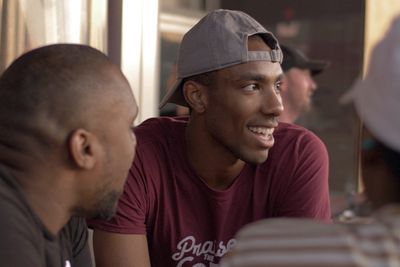A federally-funded HIV intervention program for young Black men continues in North Nashville despite obstacles brought on by the COVID-19 pandemic.
Although HIV rates are becoming manageable overall, there is still work to be done. According to the Centers for Disease Control and Prevention, in 2018, 52.8 percent of new HIV diagnoses were among 13- to 24-year-old Black men who have sex with men (BMSM). The vast majority are ages 18-24 years old.
Vanderbilt sociology professor Sandra L. Barnes leads the IAM! Experience, funded by a $1.5 million, five-year grant from the Department of Health and Human Services’ Substance Abuse and Mental Health Services Administration. Barnes and her team provide an intensive risk-reduction prevention program, including free HIV and Hepatitis-C testing, behavioral and spiritual support, and focus groups, in partnership with Fisk University, in North Nashville.
“Through our work, we have created safe spaces and positive support systems for young Black men who may not feel comfortable accessing prevention information through traditional channels,” Barnes said. “Because of COVID-19 we have had to take our prevention program and related efforts online, but our work continues in supporting the development of positive racial, sexual and spiritual identities of our participants.”
More than 200 BMSM or Trans individuals have participated in the two-day intensive IAM! prevention program; hundreds more receive other support services and referrals. Although a lack of in-person contact is not ideal, Lead Health Education Specialist Antonio McFadden said connecting with the target population online has been successful.
“It came as a surprise that during the pandemic we have been able to reach more people and a broader spectrum of people through our virtual programs,” McFadden said. “We realized that being at home has created a space for folks to do things they wouldn’t normally have time to do. We’ve also discovered people are in need of spaces to be heard and to exist with other LGBTQI+ folks.”
Like everyone dealing with the isolation brought on by the pandemic, young BMSM and Trans individuals are expressing a need for support systems and companionship. The researchers have observed that many in the population have taken steps to prevent the spread of both HIV and COVID-19 by quarantining with their partners.
They also have observed that some of the young men who are home from college have expressed difficulties readjusting to family life.
“Being forced to return home sometimes means they are going back to unsupportive households,” McFadden said. “Persons who face family rejection are often uncomfortable in their own homes, or didn’t go back at all.”
Despite all the work being done through the research project, there remains a lack of resources and support for young Black men who are dealing with more than one marginalizing identity, Barnes said. She noted that the lack of low-cost housing locally is a major challenge.
“You have race, age, sexual identity and socioeconomic status; and the intersection of these identities can create a domino effect,” Barnes said. “Even if individuals feel good about their identities, that doesn’t change the fact that the broader population often marginalizes them. The young persons we partner with are very adaptive and resilient, but there are not enough supports out there and that’s one thing that really needs to change.”
Barnes and her team will continue to summarize their findings which will be published in a book, a documentary and scientific journal articles.
Learn more about the IAM! Experience.
The “I AM” Experience is a collaborative partnership between Vanderbilt University and Fisk University to develop a capacity-building initiative for substance abuse and HIV prevention for Black/African American men who sleep with men (BMSM) ages 18-24 years old in Nashville, TN.
This story has been supported with a grant from the Facebook Journalism Project for COVID-19 coverage.
